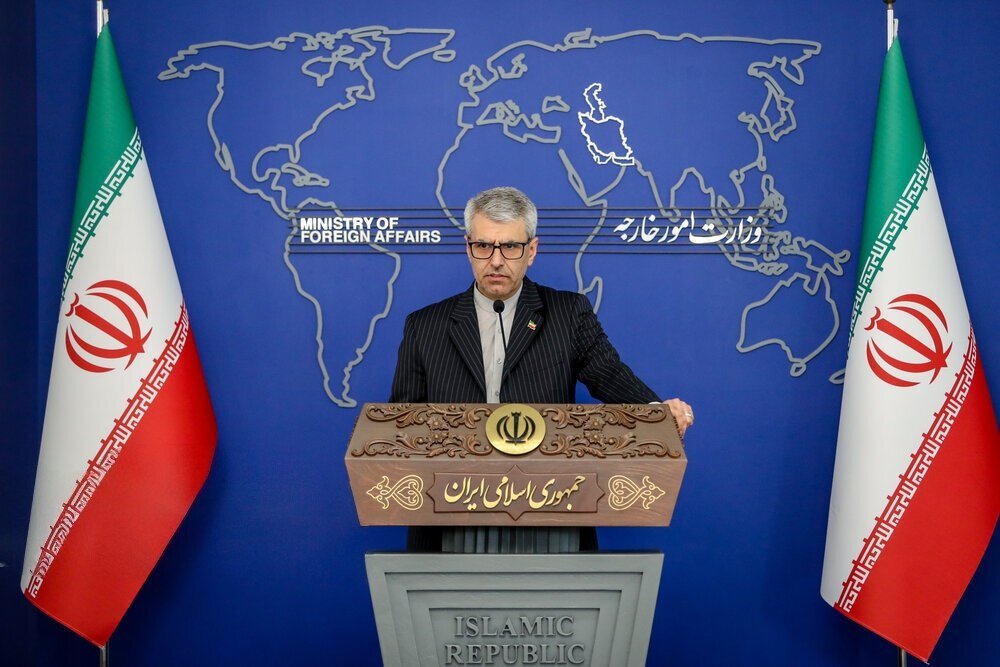TEHRAN – Esmail Bakaei, a spokesman for Iran’s Foreign Ministry, stressed Tehran’s unwavering demand for the complete removal of “illegal and repressive” sanctions as the cornerstone of indirect nuclear negotiations with Washington.
At a weekly press conference on Monday, Baqaei stressed that Iran’s economic normalization and the assurance of updated US violations remains important to maintain diplomatic progress.
“Our main demand in negotiations is the lifting of illegal and unfair sanctions against Iran,” declared Fukaei, dismissing Washington’s “selective compliance” into international law.
He emphasized that removal of sanctions must be “specific and effective” to allow Iran to resume its routine economic, trade and banking activities.
“Past experiences have taught us that the promise of the sky is insufficient. We need irreversible measures,” he adds, hinting at the US withdrawal from the 2015 nuclear deal.
Iranian Foreign Minister Abbas Aragci and US President Donald Trump’s envoy on West Asia, Steve Witkov, held two rounds of indirect talks this month to tackle Iran’s nuclear program and lift U.S. sanctions.
The discussion took place in two international hubs. This took place in the first round in Muscat and in the second round in Rome on Saturday.
After the second round, Araguchi noted that Tehran and Washington had achieved a “better understanding” about some important principles and objectives. However, he said Iran has not raised its hopes and remains cautious.
Based on this advancement, both sides agreed to begin technical discussions at the expert level in Oman from April 23rd.
Follow-up, a third high-level negotiation, which will begin in Oman on April 26th, will review the results of the expert meeting and assess the move towards a potential agreement.
Furthermore, at his press conference, Bakaei dismissed speculation about the change in venue for the meeting, noting that Oman’s “professional and pivotal role” contributed to the event.
“At Oman’s proposal, the second round was moved to Rome by a tripartite agreement and we did not oppose the proposal out of respect for Oman,” he said, adding that Iran is grateful for Italy’s cooperation.
The spokesman rejected “media sensationalism” on details of the negotiations, particularly the negotiations that the New York Times alleges, which it claims to involve Iran’s proposals in its nuclear program.
“We don’t confirm these claims. Media speculation undermines the diplomatic severity,” he argued.
“Europe must decide: Facilitators or occlusionists?”
The idiot rays who dealt with European powers have urged E3 (UK, France, Germany) to “revive their roles” as signatories of the Joint Comprehensive Plan of Action (JCPOA) rather than reflecting US pressure tactics.
“The reference to the ‘snapback mechanism’ is not structural. Europe needs to decide. Facilitator or occlusionist? ” he said.
Iran maintains dialogue with Russia, China and E3 through negotiations, reflecting its commitment to multilateralism. However, the idiots emphasized that Iran “informed” the negotiations to European countries, expressing his hopes to acknowledge Tehran’s “integrity intent” and “supporting the ongoing process.”
Grossi urged people to avoid “politically motivated stories.”
Iranian diplomats criticized the International Atomic Energy Agency (IAEA) Chiefrafaer Grossy’s recent report on Iran’s nuclear program, urging the agency to avoid a “political motivational narrative.”
“The IAEA must adhere to its technical duties, rather than serving the US-led pressure campaign,” he said, saying Iran’s voluntary transparency measures exceed legal obligations.
Regional Diplomacy Progress: Saudi Arabia Visited “Pre-Planned” Pakistani Bonds
The Bakaray has revealed that Saudi Defense Minister Khalid bin Salman’s recent visit to Tehran was “pre-planned” and unrelated to US speeches and was a fruit of Iran’s “neighborhood policy.”
“This dialogue highlights the ability of local actors to ensure stability without external interference,” he said.
A spokesperson argued that “regional countries must be able to move towards stability in the Persian Gulf and beyond by relying on their capabilities and promoting mutual trust.”
He also added that debate naturally occurred in any interaction during this period, with Iran taking initiatives to engage with neighbouring and regional states and explain the negotiation process.
During his visit, Prince Khalid met with Ayatollah Seyed Ali Khamenei, leader of the Islamic Revolution, and Major General Mohammad Bagheli, President Mausud Pezeshkian and chief of staff of the Iranian army.
During his meeting with Prince Khalid, Ayatollah Khamenei emphasized the mutual benefits of close bonds.
“We believe that the relationship between the Islamic Republic and Saudi Arabia will benefit both countries as they can complement each other’s strengths,” the leader said according to a transcript released by his office.
In Pakistan, the idiots describe bilateral relations as “permanent and strategic,” focusing on joint efforts to combat terrorism along shared borders. “The liaison officer is currently stationed to enhance security adjustments,” he revealed, downplaying the recent border incident as “an isolated issue requiring mutual trust.”
Kuwait urged him to negotiate with Arashfield. Israel’s “expandist occupation” of Syria has been condemned
In response to Kuwait’s claims about the Arashgas field, Bakaei reiterated that “repeating unfounded claims through the media will not create legal rights.”
He invited Kuwait to “accept long-standing offers for Iran’s technical consultations,” prompting a transition from conflict to “friendship and shared interests.”
In Syria, the idiot rays condemned the “expandist occupation” of the Israeli regime Golan Heights and parts of southern Syria, equating it with a “significant violation of international law.”
“The silence of the Security Council enables Zionist regime crimes. Regional states must unite to end this invasion,” he said.

